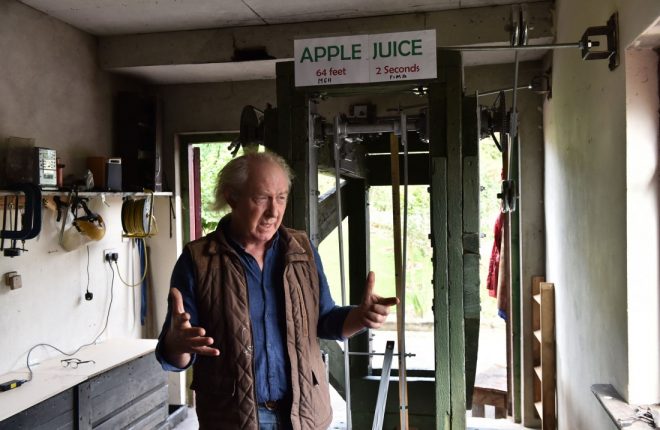
Rossgier man and physics junkie Chris Devine with his pendulum prototype which he says could change the way we generate electricity.
A self-confessed “physics junkie” has developed a mechanism which he says could revolutionise the way electricity is generated.
Energy and how it is created has been a passion of Chris Devine’s for decades. Now, from the garage of his Rossgier home, he believes he may have come up with a way of slashing household power bills.
The idea, Mr Devine says, is “difficult to explain because of its simplicity”, but having trawled thousands of ideas lodged with patent offices worldwide, he has found that as of yet, no one has put a copyright on his discovery.
“I’ve searched patent offices in all the obvious places – Russia, China, America, Australia, Germany, Holland, Taiwan, Malaysia, and nowhere has anyone got the pendulum turning at a constant speed with constant torque,” he revealed.
The Donegal man does stress that he has not rewritten any of the laws of physics. His breakthrough though does centre on technology dating back to the very first century.
For hundreds of years pendulums – from the Latin pendulus, meaning hanging – have been used by scientists in a range of fields. As well as accurate timekeeping, pendulums have been employed to measure earthquakes, to assist in satellite development and even as torture devices.
In more recent years though interest has grown in how pendulums can be used to conserve, and create, energy.
In Chris Devine’s case he has developed a way of creating energy on both the pendulum’s back swing and on its front swing, something he believes no one else has ever managed to harness.
To demonstrate the science of his discovery, he has constructed a miniature pendulum device in his garage, one he has named Apple Juice as a nod to one of the fathers of modern physics, Sir Isaac Newton.
Chris has tested his theory over and over and is convinced that what he has stumbled upon could change the way we generate our electricity.
So convinced in fact that he is happy for any mechanical engineer or physics expert to come, have a look and take any readings they want.

Apple Juice…Chris has named his machine as a nod to Isaac Newton.
“It is such simple technology that I’m baffled it has never been done,” he said.
“This is not an experiment because the research is done and the results are there. The pendulum is rotating the shaft at a measurable speed with measurable torque. Guaranteeing output would not be a problem.”
Rather than market his idea for vast profit though, Mr Devine says he would like to develop it to a point where it can generate enough electricity to power a town the size of Strabane.
That would involve building a 64ft pendulum structure at an outlay in the region of £700,000.
Because of the cost, Chris Devine is appealing for local investors to buy into his idea.
“There is no wastage here and the cost to the end user would be somewhere in the region of six pence per unit.
“It will cost about three pence per unit to produce the electricity and that is why I am looking for investors to help me build the big one. You can always get the man who will invest but who will want to own it but what I want is for the community to get a hold of it.
“I realise it is about getting people to understand it first but the bottom line is that electricity can be generated locally at a fraction of the cost and local people will have control over it.
“With a town the size of Strabane, it would mean electricity at five or six pence per unit where at the minute people are paying 15 or 16 pence.”
Having dedicated years of his free time to science and the study of physics and energy, Chris says his idea is not something he dreamt up over night.
“I wanted to be sure, firstly that I understood it and secondly that I hadn’t overlooked anything. That is why I have only just gone public with it now.
“But I would invite any mechanical engineer to come and take power measurements from it and if anyone wants to go down the physics route, well that is not a problem either.”
Anyone interested in finding out more about Chris Devine’s work or who would possibly be interested in investing in it, he can be contacted by email at cdevine53@gmail.com or by ringing 086 3620286.









